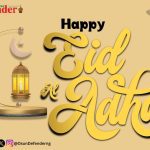By Sheik Musa Oladapo Raji
ALL praise is due to Allah the Lord of the universe, the Sustainer and Cherisher of our lives. He whom Allah guides is rightly guided, but he whom He sends astray for him he would find no one guiding friend (waliyy) to lead him (to the right part). I testify that there is no diet worthy of worship except Him and I also testify that Prophet Muhammad is His servant and His Messenger. May the peace and mercy of Allah be upon His soul, member of His household, His companions and those who follow him till the day of accountability.
There is no doubt that ‘idul-adha and hajj exercise are interwoven because (wuquf on Arafat) stand on Arafat could be described as a harbinger of ‘idul-adha. Arafat is on the 9th day of Dulhijjah while ‘idul-adha is on the 10th day.
A scholar once said that: “Indeed Allah has three different tens: i.e the first 10 days of Muharam (the first lunar month), the last ten day of Ramadan (the ninth lunar month) and the first ten day of Dhul-Hijjah (the twelfth lunar month) those periods are full of various degree of meritorious acts of worship. Muslims are enjoined to grasp the advantages of each whenever it is around. Ibn Abbas (RAA) relates that the Holy Prophet (SAW) said: There is no other days during which virtuous action is so pleasing to Allah as the first ten days of Dhul-Hijjah. The companions submitted: “O Messenger of Allah, not even fighting in the cause of Allah? He (SAW) answered: yes! Not even Jihad in the cause of Allah except in the case of a person who goes on Jihad along with his life and property and does not come back with either. (i.e he is martyred in Jihad). Having understood the importance of these 10 days, it is pertinent to state here that the hajj exercises actually kick-start on the eight day of the said month, otherwise known as Yaomu Tarwiyya. Because all the pilgrims would leave the city of Makkah for Mina (about three miles east of Makkah) where the Pilgrims will remain for five to six days to perform some rites of Hajj. The tenth day is the day when the Pilgrims will throw the pebbles at the designated place, known as jamratul kubrah, with slaughtering of the rams to atone sins they might have committed during the exercise. Those that are not there on the other hands are also slaughtering their rams across the Globe. known as Ileya to us. Eleventh to thirteenth days are also used to throw pebbles at designated places and slaughtering of sacrificial lambs by the Muslims across the world.
When the injunction was first mentioned by the Prophet, His companions inquired to know what would be their gains and he said, it was the reawakening of the Sunnah of their forefather Ibrahim (AS). It is also enjoined that throughout the period, Allah’s name should be magnified and glorified after obligatory prayers. The period is known as “Ayyamu tashreeq”.
It is enjoined by the Prophet that anyone who intends to offer a sacrificial lamb for the sake of Allah should not cut his/her hair or clip his/her nails between the first and 10th days of the month.
What Type Of Animal Can Be Sacrificed And What Is The Position Of Shari’ah On It?
To start with it, it is an established Sunnah, binding on anyone who can do so irrespective of age and status. For the feast day, immolation of a ram is preferred to a sheep. He goat is also preferred to the she one. Same rule applies to both the cow and camel. However, it is not permitted to select a one-eye or sick animal, nor a lame one whose ribs show, nor an emaciated one with no fat, nor one with any kind of defect. Neither is it permitted to select one with a slit ear, unless it is only slit a little; the same holds for one part of the ear cut off. An animal with a broken horn is not permitted if it is bleeding but if it is not, it is permitted. It is recommended that any Muslim that wants to do this important rite should do it by himself instead of using a proxy. When he is about to slaughter it in the case of sheep or pierce at in the case of Camel, he should say “Bismillah Allahu Akbar, Allahuma haadha minka walaka” “in the Name of Allah, the greatest. O! Allah this is from you and for you”.
When they asked the Prophet of what benefit would be for them (the immolation), He responded that for every hair of the slaughtered animal is goodness for them. They asked further how about the wool? Then he said: for every wool of the slaughtered animal is goodness for them. It must be noted here that one should cut both the larynx and jugular veins properly. Any cut less than is not enough. Care must be taken that one should not remove his hand/knife until he is convinced that he cuts it properly, for if he removes his hand and returns it back to continue the cutting such animal should not be eaten.
Abu Ya’ala bin Anas (RAA) reported that the Prophet (SAW) said; “Undoubtedly, Allah has ordered good behaviour with regard to everything, if you will kill, kill it nicely. If you slaughter, slaughter it nicely. Let each one of you sharpens the edge of knife properly and make the slaughtered die quickly.” Muslim related it.
It must also be noted that time of slaughtering should be after one is sure of the slaughtering of Imam for anybody does his before that of Imam is not regarded as Ileya slaughtering.
Muslims are enjoined to fear Allah in everything they do, because He Allah accepts only from the pious (Muttaqin). Allah says: “It is neither their meat nor their blood that reaches Allah, but it is piety from you that reaches Him”. Quran 22:37.
Allah has equally given us the direction on how to distribute the meat when He says:“ … eat thereof, and feed the poor who does not ask (men) and beggars who ask (men) thus have we made them subject to you that you may be grateful”. Quran 22:36.
WHAT ARE THE DERIVABLE LESSONS FROM ‘EIDUL-ADHA?
Attempts have been made by many scholars to drive home lessons from it. Prominent among the lessons are:
- Total obedience to the commandments of Allah as demonstrated by Prophet Ibrahim (AS).
- Total obedience to one’s parents and perseverance as demonstrated by Prophet Ismael (AS).
- Allah tests (Balaa) His Servants from time to time.
- Fulfillment of promise as did by Prophet Ibrahim (AS).
- Importance of (Al-ihsaan) goodness and generosity to ones neighbours.
- Importance of prayer and
- Importance of remembrance of Allah (Adh-dhikr).
Some of the etiquettes of the ‘id prayer
- These days (Ayyamu tashreeq) are days of dine and wine and remembrance of Allah the Mighty.
- We should not eat before we leave for the ‘eid praying ground until we returned home. That was the practice of the Prophet, He would not leave for ‘id during ‘idul-fitri until he eats, and he would not eat on Ileya day until when he returned, He would then eat from the liver of his slaughtered ram.
- Taking of ritual bath, applying scent and wearing of one’s best cloth. The Prophet had directed us (for the two ‘id) to wear the best of our clothes, to use the best scent available and to slaughter the expensive ram.
- Exchanging of pleasantries. Islam teaches us to greet and congratulate ourselves. It even recommended the manner of greeting, it goes thus: “Taqabala Lahu minna wa minka. May Allah accept it from us and you”
On a final note however, I want to draw our attention to innovation recently introduced to ‘idul-adha. tagged as ‘Ileya carnival’, where we see some youths, not necessarily Muslims, barricading the road, with a view of extorting money from the road users and in most cases, doing so under the influence of alcohol. If this goes on unchecked, the incoming generation may consider it as part of “Ileya” festival. I therefore, appeal to our fathers, Chief Imams, scholars of great repute and preachers to vehemently oppose this move during their various sermons on ‘id day as well as on Fridays’ Khutbah. Let them realise that it is an alien custom to Islam, let us also encourage our youth to see the importance of dignity of labour instead of looking for shortcut through rituals killings kidnapping and internet fraud of all kinds. It is only Allah that is worthy of reliance on.
Until the close of our request, will be AlhamduliLlahi Rabil‘alamin.
Imaam Raji Musa Oladapo the Chief Imaam of Telemu








